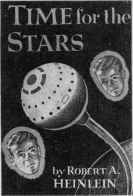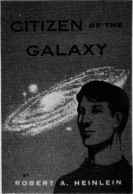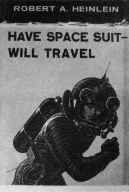Grumbles from the Grave (15 page)
Read Grumbles from the Grave Online
Authors: Robert A. Heinlein,Virginia Heinlein
Tags: #Authors; American - 20th century - Correspondence, #Correspondence, #Literary Collections, #Letters, #Heinlein; Robert A - Correspondence, #Science Fiction & Fantasy, #20th century, #Authors; American, #General, #Language Arts & Disciplines, #Science Fiction, #American, #Literary Criticism, #Science fiction - Authorship, #Biography & Autobiography, #Authorship


(76)
Time For the Stars,
Scribner's, 1956. Cover art by Clifford N. Geary. Dalgliesh thought that the hero might be too old for a juvenile novel.
Tom and Pat are identical twins. When tested by the Long Range Foundation, they are found to be telepathically linked. Thus, eventually, Tom is chosen to go to the stars on a torch ship, reporting back to Pat, who remains on Earth (investing their combinedincomes and building in time a financial empire). At almost light speed, time is slowed enormously—as Einstein showed—so Tom seems to stay young while Pat ages. Eventually, Tom can no longer contact his twin, but by then can contact Pat's daughter—and then granddaughter and finally, Vicki, Pat's great-granddaughter. The ship explores new worlds, but finally cannot go on. Then they are rescued by the first faster-than-light ship, made possible by what the ship has revealed of time. Back on Earth, Tom finds Pat is a very old man. But Vicki is just the right age!
December 13, 1955: Robert A. Heinlein to Lurton Blassingame
I have finished the new Scribner's book,
Time for the Stars,
and it is today being started by the typist. I expect to send you ms. in January, which should be plenty of time to try to sell serial rights.
Please do not tell Miss Dalgliesh I have finished it, or she will want to see it early—and I don't want her to have any more time to second-guess than her schedule requires. If she asks about it, please tell her that you understand I have it in process and that you are sure that I will be on time as usual . . . all of which is the literal truth.
March 9, 1956: Robert A. Heinlein to Lurton Blassingame
Now, about
Time for the Stars.
I don't feel strongly about it at all. If [Dalgliesh] wants to cut some of the opening, she is welcome to do so. If she prefers to have me cut it, tell her to send the chapters she wants cut back to me
with specific instructions as to just what parts she wants eliminated and just how many words she wants taken out.
Or she can do it herself, if she prefers.
I don't understand the criticism about age group appeal. She complained that I had lost them the Armed Services market in
Rolling Stones
by making the twins two years under draft age when the story opened, even though they were eighteen when the story closed. So in this story I very carefully made the boy just graduating from high school with an implied age of eighteen—and he is too old, she tells me.
Is
Stover at Yale
no good for high school kids just because the hero is old enough to be in college?
I can make my central character
any age she wants
at the opening of the story. But it can only be one age. If she will tell me what age she thinks is best for the market, I can tailor the central character of my next book to fit. But I can't make him simultaneously of draft age and of junior high school age. Nor can I keep him from growing up as the story progresses without limiting myself to a simple action story spanning not more than a few weeks. This is difficult to do in space-travel stories—but I can do it if she wants it.
CITIZEN OF THE GALAXY

(77)
Alice Dalgliesh considered
Citizen of the Galaxy
to be Heinlein's best book.
Thorby is a slave, abducted as an infant and suffering all a slave's mistreatment for years. Now he is sold again, this time on Sargon to Baslim, a beggar. But Baslim treats him well, frees him, adopts him, and teaches him all a beggar's tricks. Baslim, he slowly realizes, is really an intelligence agent in a war against slavery. Then Baslim's work is discovered and he is eliminated.
Thorby finds safety for two years among the Free Traders and learns their ways. Then he is taken to the Guard and enlisted. But then he is identified as the lost heir of one of Earth's most powerful families—one secretly supplying the slavers!
It takes more time to learn new ways. Then he forces out the crooked managers and takes over—to use his wealth and life fighting the slave trade.

(78)
Citizen of the Galaxy
was also serialized in
Astounding
from September to December 1957, but there were some differences from the Scribner's book edition. Here, cover art by Van Dongen.
December 11, 1956: Robert A. Heinlein to Lurton Blassingame
I have completed a draft of the next novel [
Citizen of the Galaxy
] intended for Scribner's. The present title is
The Chains and the Stars.
It ran considerably too long, so I have two or three weeks of cutting to do on it. I hope to have the chewed-up copy in the hands of a typist by Christmas, which should enable me to place a copy of it for possible serial sale in your hands around the middle of January. The Scribner's copy will meet Miss Dalgliesh's deadline (what date this year?), but I will send it later, as I want to cut and slant the serial (adult) version slightly differently from the Scribner's (juvenile) version. As usual, it is an ambivalent story, actually adult in nature but concerning a boy and with no sex in it that even Great Aunt Agatha could object to. But I am going to try this time to improve it a little for each market with some changes in emphasis.
February 8, 1957: Lurton Blassingame to Robert A. Heinlein
Alice Dalgliesh says
Citizen
Robert's best story to date.
February 28, 1957: Lurton Blassingame to Robert A. Heinlein
No more cutting on
Citizen—
it's a tight story, more can't be taken out. Miss Dalgliesh wants one very small cut, about organized religion.
May 17, 1957: Robert A. Heinlein to Lurton Blassingame
Thanks for the suggestion about submitting plots for approval to Miss Dalgliesh, but we tried that once or twice and it just caused trouble; she approved the plots in outline but not when she saw the story, even though I had stuck to the plot line. This caused the biggest hassles I've had with her, over
Red Planet
. . . which has merely turned out to be her biggest seller of the list, even though I refused all of the changes she wanted where they differed from the approved plot. No, if I ever submit to her another story, it will be sight unseen till then and take it or leave it. I know I have not made clear why two changes, admittedly easy and unimportant, threw me into a spin and lost me ten days working time, cum much anguish. I don't know that I
can
explain it, but it is true. Part of the reason lies in that Chicago lecture of mine you read recently: [Mark Reinsberg arranged this as a seminar of four lectures, which were published as The Science Fiction Novel by Advent Publishers]. I necessarily write science fiction by one theory, the theory of extrapolation and change—but once it reaches the editor (in this case) it is tested by an older theory, the notion that this our culture is essentially perfect and I
must not
tinker with any part of it which is dear to any possible critic who may see the story. These things have now added up to the point where I feel unable to continue. I
may
write another. I don't know yet. I can't until some of the depression wears off. But I don't know how to tell her that I probably won't deliver the story she is expecting—I've tried six or eight times, wasted many days, and all the ways I can express it either sound rude or inadequate. I know this sounds silly, but it is true.
HAVE SPACE SUIT—WILL TRAVEL

(80)
Have Spacesuit Will Travel,
Scribner's, 1958, became a Heinlein classic.
While Kip Russell is trying out the repairs he has made on the space suit he won in a soaf contest, he hears a voice over his radio: "PeeWee to Junebug!" And he is off on an adventure with PeeWee and the Mother Thing to the stars.
Set down on Pluto, the Mother Thing attempts to communicate with her people, but fails, and Kip must go outside in blistering cold to rescue her. They are then taken to the Lesser Magellanic Cloud where, together with a Roman centurion, lunio, PeeWee, and Kip are put on trial to defend the human race before a tribunal of a highly civilized race.
* * *
November 8, 1957: Robert A. Heinlein to Lurton Blassingame
Here are three copies of my new novel for Scribner's
Have Space Suit—Will Travel.
They are intended (I hope) for trade book, American serial, and British serial.
November 19, 1957: Lurton Blassingame to Robert A. Heinlein
Have Space Suit—Will Travel
is a fine story . . . enjoyed all of it.
December 6, 1957: Lurton Blassingame to Robert A. Heinlein
Scribner's enthusiastic about the book.
CHAPTER IV
THE LAST OF THE JUVENILES
STARSHIP TROOPERS

(82)
Alice Dalgliesh and the entire Scribner's editorial board turned
Starship Troopers
down. Putnam's eagerly picked up the title and Heinlein moved his career.
In this culture, the franchise or right to vote must be earned by volunteering for Federal Service. It is not necessary that this service be in the military—quite the opposite. Johnny's decision to enter the military is opposed by his father, but upheld by his instructor in history and moral philosophy. So Johnny goes into the Mobile Infantry. We first see him in a drop.
